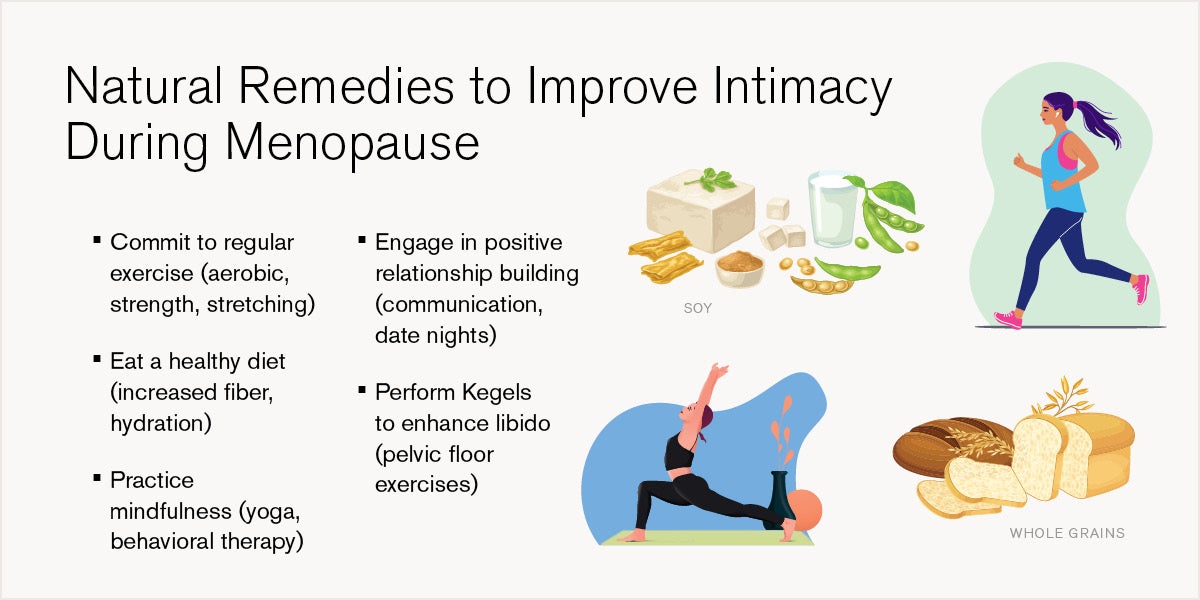Menopause and sexual wellness: What you need to know
November 11, 2025
By: Mary Lynn, DO
Categories: Women's Health, Obstetrics & Gynecology
Tags: menopause, female sexual dysfunction, sexual dysfunction
Menopause is a natural life transition that often brings emotional and physical challenges, particularly affecting libido and sexual health. While menopause symptoms can be disruptive, they are often times very manageable, helping intimacy remain fulfilling well into the later years of your life.
“Menopause is a retrospective diagnosis. You don’t know the exact moment it happens until you’ve gone a full year without a period then you can look back and say, ‘That was the day.’ It’s not something you can pinpoint in real time, which is why it often feels like a gradual transition,” says Mary Lynn, DO, obstetrician and gynecologist at Loyola Medicine.
How hormonal changes affect your sexual health
Menopause begins when you haven’t experienced a menstrual period for 12 or more months. Most women reach menopause, on average, by the age of 51, but this can vary. Before this point, your menstrual cycle will undergo various changes that usually begin in your late 40s, such as lighter or heavier periods, shorter or more irregular cycles and other noticeable differences. This time is known as perimenopause. During menopause, women who were previously enjoying fulfilling intimate lives may start to notice physical and emotional changes that also affect libido.
Changes in hormone levels are the primary reason for these difficulties. Estrogen is an extremely important hormone that plays a role in sexual and reproductive development. In women, estrogen contributes to:
- Menstrual cycle
- Sexual desire
- Brain function
- Bone health
- Skin health
- Lipid metabolism
During menopause, the levels of estrogen drop dramatically, creating numerous sexual health challenges, including:
- Vaginal dryness and thinning, leading to painful intercourse
- Reduced sensitivity and arousal from less blood flow
- Mood swings, anxiety and depression
How to regain your intimacy during menopause
While menopause introduces new challenges when it comes to sexual health, it doesn’t mean the end of a fulfilling sex life. With education and support, you can find solutions that are right for you. There are many medical treatments and lifestyle changes that can help boost your libido and improve your sexual health and well-being.
“Unlike hot flashes or night sweats, sexual health symptoms don’t usually resolve on their own. If left untreated, they tend to worsen over time. What’s more, they may not appear immediately as some women experience them years after menopause. That’s why early intervention and education are so important,” says Dr. Lynn.

Treatment options to boost libido during menopause
Hormone replacement therapy (HRT)
HRT is one of the most effective treatments for managing menopause symptoms. It works by supplementing the body with estrogen (and typically progesterone), which can help alleviate vaginal dryness, improve mood and restore sexual desire. HRT comes in various forms, including pills, patches, gels and vaginal creams. It’s important to consult with a health care provider to determine if HRT is appropriate for your health history and needs.
Vaginal estrogen treatments
For women who experience vaginal dryness or discomfort during intercourse, localized estrogen therapy is highly effective. These treatments, available as creams, tablets or rings, deliver estrogen directly to vaginal tissues, improving elasticity, moisture and overall comfort without significantly affecting the rest of the body.
Non-hormonal options
If hormone therapy isn’t suitable, there are non-hormonal alternatives that can help. Vaginal moisturizers and lubricants can reduce discomfort during intimacy. Some women also benefit from medications like ospemifene, a selective estrogen receptor modulator that treats painful intercourse without traditional hormone therapy.
Lifestyle changes
Regular exercise, a balanced diet and stress management can positively impact sexual health. Physical activity boosts circulation and mood, while a diet rich in phytoestrogens (found in soy, flaxseed, and whole grains) may help balance hormone levels naturally. Mindfulness practices, yoga and therapy can also support emotional well-being and intimacy. Also, pelvic floor physical therapy can strengthen muscles that support sexual function. It may improve blood flow, reduce pain and enhance sensation. Therapists trained in this specialty can guide you through exercises and techniques tailored to your body.
“Menopause affects more than just hormones; it touches every part of a woman’s life. I use a biopsychosocial approach, looking at biological, psychological and social factors. Whether it’s body image, relationship dynamics or mental health, we need to address all of it. Every woman’s experience is unique, and care should reflect that,” says Dr. Lynn.

